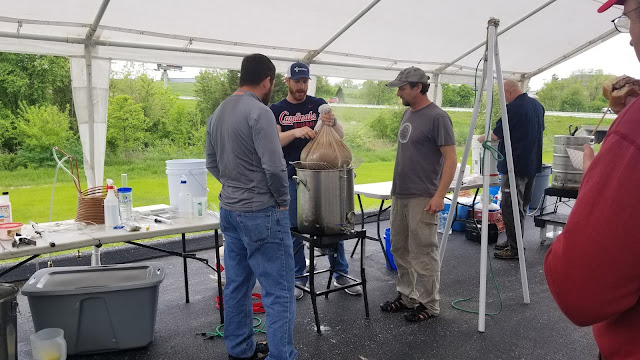As most of you know, we have been home brewing for a while now. It started about 5 years ago when I got the The Hubs a Groupon for a 5-gallon bucket system and a brewing class from our local homebrew store. It should be noted--The Hubs does most of the brewing--I help with sanitizing, cleaning, stirring when his arm gets tired, handing him things, acquiring bottles, and bragging on him since he's his own worst critic.
Our first batch in 2014, an American Bock (this is a really solid kit, FYI. Great beer).
We did extract-based kits for most of that time. If there are any non-brewers reading this: one of the first steps in brewing is the mash--which is steeping crushed or cracked grains in warm water to extract the starches & convert them into fermentable sugars, forming the "wort" or beer base. In order to simplify/expedite the home brewing process, you can buy malt extract which comes as either a dry powder or a thick syrup. This process requires less equipment so it's a good option for those who are new to homebrewing, or who don't have time/space for the full process.
We slowly upgraded our equipment--first getting a copper coil wort chiller to speed up the cooling process (rather than doing an ice bath in the sink), and then getting a conical fermenter so we could easily remove sediment and then bottle directly from it, rather than having to transfer beer from the fermenting bucket to the bottling bucket.
The hydrometer that came with the basic brewing kit was tough to read and we were concerned we weren't getting accurate ABV calculations, so we got a refractometer which seems to be working better.
About a year ago, The Hubs joined a local home brewers group, and we went to several Big Brew Days where the brewery store would demo different brewing methods.
The Hubs took a class on all-grain brewing a couple years ago, but we held off for a long time because the process just takes longer--We could make a 5 gallon batch of beer using an extract kit in about 3 hours (aka, during Lil' Man's nap), whereas all-grain takes about 5-6 hours--so it's more of an all-day process.
But there's also a cost trade off--malt extract kits run about $30-50, depending on the type of beer. But with all grain brewing, buying the raw ingredients is cheaper--a typical all-grain kit is around $20-25. If you brew enough to buy in bulk, you can save even more.
Bulk buy of ingredients for three batches of beer. We were having them double-mill the grains at the store, but we've also since bought a grain grinder so we can buy raw grains and mill them at home.
I think the breaking point for us was when The Hubs wanted to brew a high ABV double IPA...it required so much malt extract that the total price of the 5 gallon batch was around $80.
So we finally made the switch to all-grain brewing: The Hubs bought a Brew In The Bag and I got him BeerSmith recipe software for Christmas. As an intermediate step, we did an Imperial pumpkin ale as a partial mash--it was the last batch we did fully on the stovetop with a 3 gallon pot. Then last year we bought an outdoor propane system on sale at Bass Pro Shops over Black Friday.
Inaugural use of the turkey fryer, making a "Miller Light" clone, while drinking delicious Rock Candy from Lost Forty in Arkansas.
We still mash on the stovetop because it's easier, and then move to the turkey fryer for the boil.
Since making the switch, we've brewed 6 beers using all-grain: a Miller Lite clone, Irish red, dunkel, rye IPA, vanilla porter, and an English mild (note: if you're interested in any of these recipes, comment below and we'd be happy to share). The Hubs prefers to brew when it's colder outside, since the turkey fryer has to be used outside and generates a lot of heat, and our fermenter is installed in our basement, so the temperatures stay a little cooler and more steady for better consistency.
The Hubs won 3rd place for its category with his Irish Red at this year's Ozarks Open--though technically he brewed that on a friend's system.
On deck next we're going to try doing a kettle sour (I promise a whole post on that once it's ready to drink).
After making the switch, it was just a short jump to moving away from bottling to having our own kegerator. I'll have a post about how we built our own kegerator up next week--stay tuned!










No comments:
Post a Comment